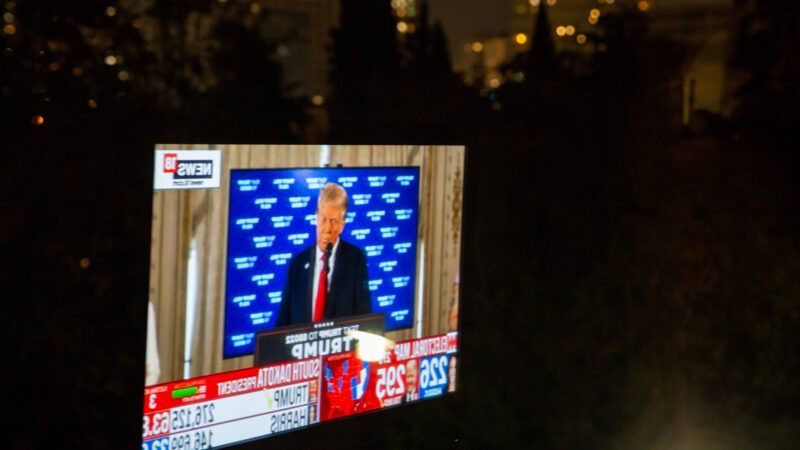After This Election, Is America Still the World's 'Indispensable' Nation?
The key reason America is so prosperous is because it has been the world's beacon of liberty, welcoming to immigrants and open to trade.

Few Americans were thinking about historical and political trends when they cast their votes for president on Tuesday, as confirmed by exit polls showing bread-and-butter issues—inflation, housing costs, and a tepid economy—topping their concerns. I don't blame Donald Trump's working-class-heavy voters for looking at their wallets and determining that anything would be better than a dose of California-style liberalism.
Post-election commentary hammered that point in explaining why a majority of American voters overlooked Trump's eye-popping character flaws, ugly campaign rhetoric, and incessant truth-bending and decided to vote for him anyway. Most of my conservative friends recognized the former president's flaws—including his election-theft conspiracies and myriad scandals—but came up with a seemingly reasonable calculus.
In their view, his tax plans, focus on deregulation, energy policies, and judicial appointments made him an easy, albeit imperfect, choice. As a libertarian, my policy calculus was more challenging given my concern about his approach toward civil liberties, immigration, and tariffs. Yet on balance his proposals seemed preferable to the ones championed by Kamala Harris. Still, I find myself saddened by his unquestionably impressive victory.
Nothing in the U.S. media put to words my unease, but an editorial in Le Monde mirrored my sentiments. As an aside, it's fitting that French observers would grasp the conundrum of the American experiment, given that Frenchman Alexis de Tocqueville in 1835 penned the insightful Democracy in America. Tocqueville was "not so much alarmed at the excessive liberty which reigns in that country as at the very inadequate securities which exist against tyranny."
I'm not particularly concerned that Trump will govern as a tyrant, despite his oft-expressed admiration for some of the modern world's worst ones and his lack of appreciation for the norms of democracy. I am convinced, however, that his victory represents the end of America's historic post-war role as the indispensable bastion of democracy, a nation committed to ideas rather than blood and soil, and one where anyone from anywhere can become an American.
Trump's election "marks the end of an American era, that of an open superpower committed to the world, eager to set itself up as a democratic model," the French newspaper opined. "It's the famous 'shining city on a hill,' extolled by President Ronald Reagan. The model had been challenged over the past two decades. Now, Trump's return is putting a nail in its coffin."
Recently, I wrote about Reagan's legacy and quoted him saying that if "there had to be city walls" in that allegorical city on the hill, "the walls had doors and the doors were open to anyone with the will and the heart to get here." That rhetoric appealed to our highest aspirations.
By contrast, Le Monde summarizes that "Trump views the world solely through the prism of American national interests. It's a world of power struggles and trade wars, which scorns multilateralism. A world where transactional diplomacy replaces value-based alliances. A world, ultimately, where the U.S. president reserves his harshest words for his allies but spares the autocrats, who are seen as partners rather than adversaries."
It's hard to disagree. In terms of foreign policy, that might mean Trump "ceases military aid to Ukraine and negotiates peace with Vladimir Putin in favor of the invader," Le Monde continues. That result—and it seems likely given Trump's and J.D. Vance's critical comments of U.S. support for Ukraine—"will go far beyond the fate of Ukraine alone. They will affect the continent's security as a whole."
Most Americans perhaps might not care about the fate of a nation they know nothing about. But the result of this new America is it will operate like any other nation that ruthlessly pursues only its own perceived interests and doesn't worry about tyrants. (Note: I'm not saying America should serve as the world's policeman.)
The irony is lost on Trump and MAGA, but the key reason America is so prosperous is because it has been the world's beacon of liberty, welcoming to immigrants and open to trade.
Trump is not a policy wonk. He says contradictory things. His supporters claim to know when to take him seriously and when he's bluffing. They say, "He won't cut off Ukraine aid" even as he makes clear his coziness with Putin. We don't really know—and his mercurial nature can at times be helpful in foreign negotiations—but we can't count on Trump siding with the cause of freedom, at home or abroad.
I've long read the paleo-conservative writers whose Trump's policies most closely follow. They argue that America is not a unique nation based on ideals, but one that's based largely on the culture of those who founded it.
So, yes, I'll enjoy my tax cuts and smile at his efforts to promote energy production, but I'll be sad to recognize, as Le Monde puts it, "The end of an American world."
This column was first published in The Orange County Register.


Show Comments (48)